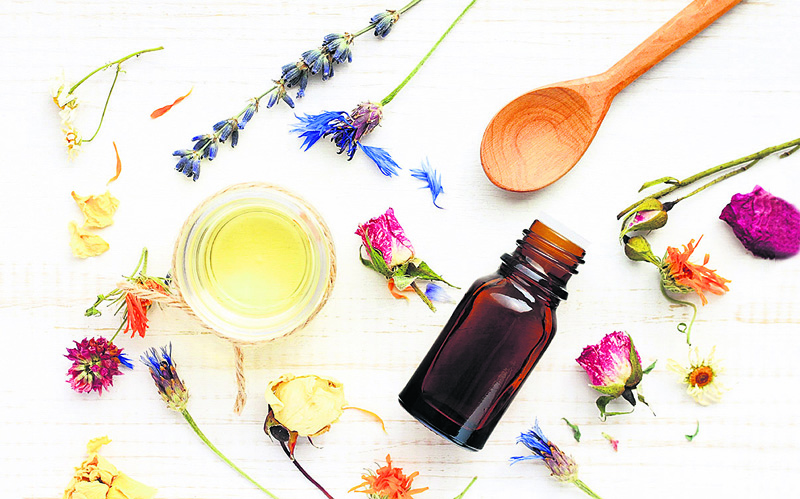
OR

Essential oils are becoming popular by the day. These natural aromatic volatile compounds, obtained from different parts of plants, swiftly change their state from solid or liquid to gas at even normal room temperature. We find a number of manufactured goods in the market that utilize essential oils but its at-home uses are just as efficacious. Laxmi Dutta Panta, from Herbs Production and Processing Co. Ltd (HPPCL), tipped The Week on some DIY methods for using essential oils. Though there are hundred of ways you can use essential oils at home, Panta shares some of the most common ones here with The Week.
Household uses
Essential oils not only smell good and freshen air but many are also known for their great anti-microbial and anti-bacterial properties. You can use lavender or jasmine essential oil for a fragrant smelling room but if you want stronger action other than just eliminating odors then maybe lemon oil is the way to go. Here are some ways in which you can use various essential oils for household purposes.
• Use lemon oil with your dishwasher to get rid of intense stains or clean burnt utensils with minimal effort.
• Add a few drops of tea tree oil or lemon oil to freshen up smelly shoes.
• Spray a mixture of rosemary, tea tree oil, or eucalyptus oil to eliminate cigarette fumes from an enclosed space.
• Place a cotton ball soaked in lime or lemon oil behind your toilet bowl and you get an effective bathroom freshener.
• Use clove, cinnamon, or citrus essential oils to eliminate all kinds of kitchen odors.
• Mix a few drops of lemon oil to your water before washing fruits and vegetables to remove any lingering bacteria.
• Add bergamot or lime oil to your cleaner and use it as a scrub for your bathroom sink or bathtub.
• Lemon oil and tea tree oil mixed with water has impressive disinfectant functions.
• Diffuse cinnamon essential oil in air and enjoy its antimicrobial properties.
Skincare
Got a headache? There’s an essential oil for that. Have a hard time sleeping? There’s an essential oil for that too. Have a skin problem? There are tons of essential oils for that. Pretty much everyone — save, occasionally, for pregnant women and young children — can benefit from a boost of essential oil. The trick is finding which ones work for you, because like any skin product, different types have different functions.
• First things first, while using essential oils for skincare purpose it is best if you apply them directly on the affected area.
• A drop each of lemongrass oil, citronella oil, and eucalyptus oil with one teaspoon of coconut oil makes a natural bug repellent that you can apply on bare skin.
• A mixture of coconut oil, shea butter, helichrysum oil, and lavender essential oil can be used as a homemade toxic free sunscreen.
• Geranium oil or ylang ylang oils are best suited for oily and acne prone skin as they balance oil production and help treat acne and eczema.
• Sensitive skin benefits from the use of basil (tulsi) and chamomile oil. These essential oils have also been known to help with inflammation.
• Antifungal and antibacterial compounds like tea tree oil, lavender oil, juniper oil and basil oils can be used to treat cuts or scrapes, and skin irritations. Juniper oil also speeds up healing time for scrapes and cuts.
• Lemongrass and cypress essential oils both have astringent functions. They also shrink up prominent blood vessels (like the ones visible in your hands, feet and neck).
• You can use neroli or clary sage oil to fight the signs of aging and revitalize mature and puffy skin.
In foods and drinks
Essential oils can change the taste of your food item or dish in a matter of minutes and take the taste up several notches. However, it is important to use high-quality essential oils in food and drink recipes. You should also keep in mind that the essential oils you use are of food grade and not perfume grade. The latter isn’t safe for consumption. You can also use fresh herbs instead of essential oils in food, for instance instead of rosemary or basil oil use fresh rosemary or basil.
• Citrus oils are the most versatile essential oil for cooking (or drinking) purposes. Mix a few drops of any kind of citrus oil with water, smoothies and other drinks and relish its freshness. Add to stir-fries and casseroles, one-pot meals, and even in dips.
• Peppermint oil has extraordinary freshening properties. You can add this to any food for fresh flavor or even to your water if drinking plain water isn’t your thing. It also eases an upset stomach and helps in energy stimulation.
• Add oregano or basil oil to your tomato sauce or black pepper oil to your salsa to jazz up the taste.
• Try lavender in dessert recipes like scones. Simple syrups added to beverages like lemonade, and even savory dishes like fish bakes can make it more interesting. Just a couple of drops for the whole recipe will add a touch of that unique floral flavor to take your recipe from bland to gourmet.
• Ginger, cinnamon and cardamom oils are used to spice up food and drinks. You can literally add them to any food/drink of your choice for some extra zing. They are also good sources of antioxidants and help in digestion.
• You can take any essential oil (that you like the taste and smell of) and add it to your food (or drink) to spike its taste. But again, keep in mind its food grade essential oil. That’s of paramount importance.
You May Like This

Locally yours
Roots Eatery is one of those joints that is neatly tucked within the labyrinth of our city, Om Bahal, near... Read More...

The choice is always yours
Lately, I have been asked a lot about my career change. These are the people I have met for the... Read More...

Visually yours
Photo books are instrumental sources of photographs incorporated with texts that tell a visual story of what has been shot... Read More...




Just In
- Govt receives 1,658 proposals for startup loans; Minimum of 50 points required for eligibility
- Unified Socialist leader Sodari appointed Sudurpaschim CM
- One Nepali dies in UAE flood
- Madhesh Province CM Yadav expands cabinet
- 12-hour OPD service at Damauli Hospital from Thursday
- Lawmaker Dr Sharma provides Rs 2 million to children's hospital
- BFIs' lending to private sector increases by only 4.3 percent to Rs 5.087 trillion in first eight months of current FY
- NEPSE nosedives 19.56 points; daily turnover falls to Rs 2.09 billion















Leave A Comment